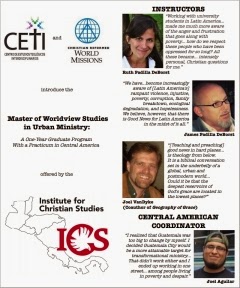Report in the form of doggerel from the AGM
Good news, we proclaim, in the great commission
Good news here too for what has come to fruition —
The Institute is recruiting for new students next Fall!!
Were it not for tough decisions there would be none at all!!
‘Twas a significant effort at the start of this year
To get Friends of ICS back on track. This prompted some cheer
Excitement abounds receiving the grant from SSHRC
With that funding in line we have gotten to work
C-P-R-S-E can be pronounced as c-prise!
But if you say that to some folks you might get a rise
The Research Centre is hard at work on matters of justice and faith
Research, writing, and events, there is so much on their plate
Fewer courses this year means more students per class
Discussing and reading, it takes work to pass
Now if a paper is written or perhaps even a story
It could go through a process to our online repository
When drumming up partners to match Institute assets
We found Costa Rica who came in and asked us
They wanted students to get a degree
From ICS in Urban Ministry
Now you might think this easy. You might think it small
The pilot cohort has only three students, after all
But starting this MWS I’ll say it out loud
Takes a ton of work so folks should be proud
This new concentration, courses and faculty were (contingently) approved by the Senate
Getting this far feels like winning the pennant!
Now, every new program has its detractors
While most are there cheering there are no doubt reactors
The effort to get here was harder than we would like
Someone might even have told me to go take a hike!
But onward and upward seeking the King
With excellent education as our mission we bring
Stimulating Biblical courses for a broader reach
Named Continuing Ed/ge, we will be starting to teach
Technology might help if more folks can be part
There is plenty to do before these classes can start
Our alumni are out there changing the world
We will seek out more stories as our records unfurl
Who are our alumni? you ask — so do we!
As we move forward our alumni are key
While students are taking great courses about Philosophy, Reformational
We are all thinking and working on sustainability for the institution, educational
Public funding is for public schools and Cath-o-lic
Grad students need funding this could be quite a trick
Maybe its just me and my own intuition
But it seems we cannot cover costs with just our tuition
Our supporters are treasured we have met them near and far
With Tom out there preaching we have a lot of miles on our car
Tom’s column in the Christian Courier is read by many church goers
Some donate now (or we hope they will) and others were once our supporters
They tell us nice things, they are excited we have arrived
Some ask about the future, some ask how ICS has survived
The many conflicts and crises the stuff of great story
While we all work here on earth, not standing still, awaiting glory
I am happy to be here to work with this team
Holding Christian scholarship in high esteem
The faculty are standouts, they have been through a lot
They teach with conviction, give it all that they’ve got
The students work hard, they are the future
Christian leaders in their fields, most not requiring a suture
[Yeah, you find a rhyme for future]
With some raised visibility among the support base
Tom and I working a lot outside of the 229 College place
We have listened quite widely, have learned from many people
We have spoken with many,under clock tower and steeple
The academy and church, scholars and donors
Have some common goals about He who gets the honors
We love our new city and new country too
The CN tower is awesome and those Maple Leafs, and the view!
But our mission is such that it’s not about us
We are your servants, in God we trust
(oh, oops, not such a Canadian phrase?)
Dawn M. Wolthuis
November 25, 2013























